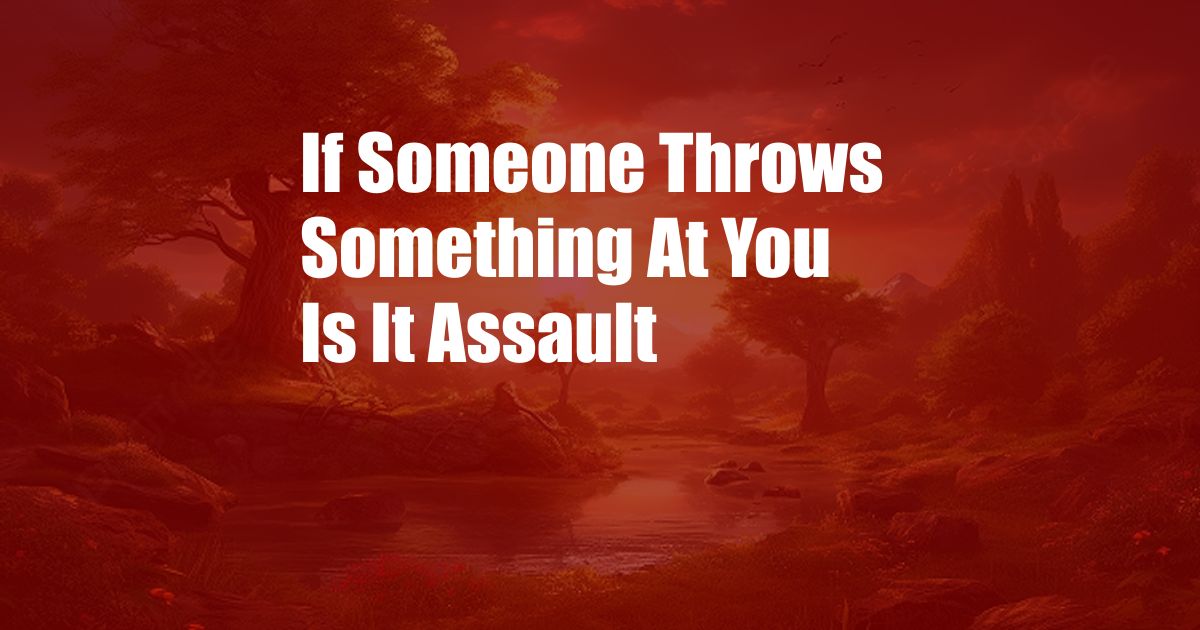
Is Getting Something Thrown at You Considered Assault?
Have you ever been in a situation where someone threw something at you? It can be a frightening and unsettling experience. You may wonder if it’s considered assault and what legal recourse you have. In this article, we’ll explore the definition of assault, the different types of assault, and what you can do if you’ve been assaulted.
Types of Assault
Assault is generally defined as any intentional or reckless act that causes another person to fear imminent bodily harm. It doesn’t require physical contact, but it can include threats of violence, menacing behavior, or the use of a weapon.
There are three main types of assault:
- Simple assault: This is the most common type of assault and involves causing minor injuries, such as bruises or scratches.
- Aggravated assault: This involves causing serious bodily harm, such as broken bones or cuts that require medical attention.
- Sexual assault: This includes any unwanted sexual contact, such as groping, fondling, or rape.
Throwing Something at Someone: Assault or Not?
Whether or not throwing something at someone is considered assault depends on several factors, including:
- The intent of the person throwing the object: If the person intended to cause harm, it’s likely to be considered assault.
- The type of object thrown: Throwing a hard object, such as a rock or a bottle, is more likely to be considered assault than throwing a soft object, such as a ball.
- The distance and speed at which the object is thrown: Throwing an object from a close distance at high speed is more likely to cause harm and be considered assault.
What to Do if You’re Assaulted
If you’ve been assaulted, it’s important to take the following steps:
- Stay calm and get to a safe place: If possible, remove yourself from the situation and go to a place where you feel safe.
- Call for help: Call 911 or your local emergency number.
- Report the assault to the police: File a police report so that they can investigate the incident.
- Seek medical attention: If you have any injuries, get them checked out by a medical professional.
- Document the incident: Take pictures of any injuries, get the names and contact information of any witnesses, and write down everything you can remember about the incident.
Tips and Expert Advice
- Be aware of your surroundings: Pay attention to the people around you and be aware of any potential threats.
- Trust your instincts: If you feel unsafe, listen to your gut and get away from the situation.
- Don’t retaliate: If someone assaults you, it’s natural to want to fight back. However, it’s important to stay calm and avoid escalating the situation.
- Seek professional help: If you’re struggling with the emotional aftermath of an assault, talk to a counselor or therapist.
FAQ
Q: What if I’m not sure if something was assault?
A: If you’re not sure, it’s best to err on the side of caution and report the incident to the police. They can investigate and determine if it was a crime.
Q: What are the penalties for assault?
A: The penalties for assault vary depending on the severity of the offense. Simple assault is typically a misdemeanor, while aggravated assault and sexual assault are felonies.
Q: What are my rights as a victim of assault?
A: You have the right to file a police report, seek medical attention, and get support from victim advocacy organizations.
Conclusion
Being the target of someone throwing something at you can be a frightening experience. Whether it’s considered assault depends on several factors, including the intent of the person throwing the object, the type of object thrown, and the distance and speed at which it’s thrown. If you’ve been assaulted, it’s important to take steps to protect yourself, such as staying calm, calling for help, and reporting the incident to the police. Remember, you have rights as a victim of assault, and there are resources available to help you.